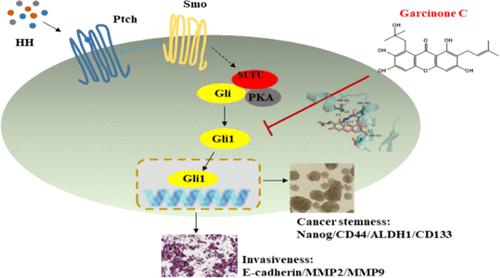当前位置:
X-MOL 学术
›
J. Agric. Food Chem.
›
论文详情
Our official English website, www.x-mol.net, welcomes your feedback! (Note: you will need to create a separate account there.)
Garcinone C Suppresses Tumorsphere Formation and Invasiveness by Hedgehog/Gli1 Signaling in Colorectal Cancer Stem-like Cells
Journal of Agricultural and Food Chemistry ( IF 6.1 ) Pub Date : 2022-06-24 , DOI: 10.1021/acs.jafc.2c01891 Yimeng Zhou 1 , Shuai Qiu 1 , Jin Tae Kim 1 , Seung Beom Lee 1 , Ho Jin Park 1 , Moon Jeong Son 1 , Hong Jin Lee 1 , Jing Chen 2
Journal of Agricultural and Food Chemistry ( IF 6.1 ) Pub Date : 2022-06-24 , DOI: 10.1021/acs.jafc.2c01891 Yimeng Zhou 1 , Shuai Qiu 1 , Jin Tae Kim 1 , Seung Beom Lee 1 , Ho Jin Park 1 , Moon Jeong Son 1 , Hong Jin Lee 1 , Jing Chen 2
Affiliation

|
Hyperactivation of hedgehog signaling occurs in colorectal cancer stem-like cells (CSCs), a rare subpopulation, potentially involved in metastasis, chemotherapy resistance, and cancer relapse. Garcinone C, a xanthone isolated from mangosteen (Garcinia mangostana), suppresses colorectal cancer in vivo and in vitro by inhibiting Gli1-dependent noncanonical hedgehog signaling. Herein, we investigated the effect of garcinone C on cancer stemness and invasiveness in colorectal cancer; Gli1 was noted as pivotal in maintaining stemness and invasiveness in HCT116 and HT29 CSCs. Garcinone C inhibited the proliferation and self-renewal of HCT116 and HT29 CSCs. Colon cancer stemness markers such as CD44, CD133, ALDH1, and Nanog were significantly decreased by garcinone C. Computational studies showed that garcinone C showed a high affinity with the Gli1 protein ZF domain by forming hydrogen bonds with amino acid residues of ASP244, ARG223, and ASP216. Besides, MG132 blocked the effects of garcinone C on Gli1. Thus, garcinone C suppressed colorectal CSCs by binding to Gli1 and enhancing its degradation. MMP2 and MMP9 levels, invasive-related markers, were increased in HCT116 CSCs but decreased by garcinone C. E-cadherin level was reduced in HCT116 CSCs, while the presence of garcinone C was restored. Garcinone C inhibited the proliferation and invasiveness of colorectal CSCs by targeting Gli1-dependent Hh signaling. Garcinone C may be a potent natural agent against colorectal cancer relapse.
中文翻译:

Garcinone C 通过 Hedgehog/Gli1 信号传导抑制结直肠癌干细胞样细胞中的肿瘤球形成和侵袭
刺猬信号的过度激活发生在结直肠癌干细胞样细胞 (CSC) 中,这是一种罕见的亚群,可能与转移、化疗耐药和癌症复发有关。Garcinone C 是一种从山竹 ( Garcinia mangostana ) 中分离出来的黄酮,可在体内和体外抑制结肠直肠癌通过抑制 Gli1 依赖的非经典刺猬信号。在此,我们研究了garcinone C对结直肠癌干性和侵袭性的影响;Gli1 被认为是维持 HCT116 和 HT29 CSCs 的干性和侵袭性的关键。Garcinone C 抑制 HCT116 和 HT29 CSCs 的增殖和自我更新。garcinone C 显着降低结肠癌干性标志物如 CD44、CD133、ALDH1 和 Nanog。计算研究表明,garcinone C 通过与 ASP244、ARG223、和 ASP216。此外,MG132阻断了garcinone C对Gli1的影响。因此,garcinone C 通过与 Gli1 结合并增强其降解来抑制结肠直肠 CSC。MMP2 和 MMP9 水平,侵袭性相关标志物,在 HCT116 CSCs 中增加,但由 garcinone C 降低。HCT116 CSCs 中 E-钙粘蛋白水平降低,而 garcinone C 的存在恢复。Garcinone C 通过靶向 Gli1 依赖性 Hh 信号传导抑制结直肠 CSCs 的增殖和侵袭。Garcinone C 可能是对抗结直肠癌复发的有效天然药物。
更新日期:2022-06-24
中文翻译:

Garcinone C 通过 Hedgehog/Gli1 信号传导抑制结直肠癌干细胞样细胞中的肿瘤球形成和侵袭
刺猬信号的过度激活发生在结直肠癌干细胞样细胞 (CSC) 中,这是一种罕见的亚群,可能与转移、化疗耐药和癌症复发有关。Garcinone C 是一种从山竹 ( Garcinia mangostana ) 中分离出来的黄酮,可在体内和体外抑制结肠直肠癌通过抑制 Gli1 依赖的非经典刺猬信号。在此,我们研究了garcinone C对结直肠癌干性和侵袭性的影响;Gli1 被认为是维持 HCT116 和 HT29 CSCs 的干性和侵袭性的关键。Garcinone C 抑制 HCT116 和 HT29 CSCs 的增殖和自我更新。garcinone C 显着降低结肠癌干性标志物如 CD44、CD133、ALDH1 和 Nanog。计算研究表明,garcinone C 通过与 ASP244、ARG223、和 ASP216。此外,MG132阻断了garcinone C对Gli1的影响。因此,garcinone C 通过与 Gli1 结合并增强其降解来抑制结肠直肠 CSC。MMP2 和 MMP9 水平,侵袭性相关标志物,在 HCT116 CSCs 中增加,但由 garcinone C 降低。HCT116 CSCs 中 E-钙粘蛋白水平降低,而 garcinone C 的存在恢复。Garcinone C 通过靶向 Gli1 依赖性 Hh 信号传导抑制结直肠 CSCs 的增殖和侵袭。Garcinone C 可能是对抗结直肠癌复发的有效天然药物。


























 京公网安备 11010802027423号
京公网安备 11010802027423号